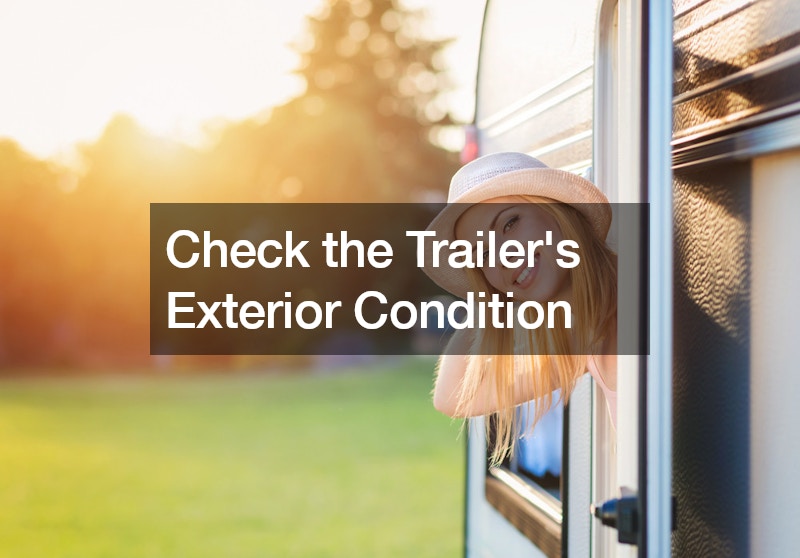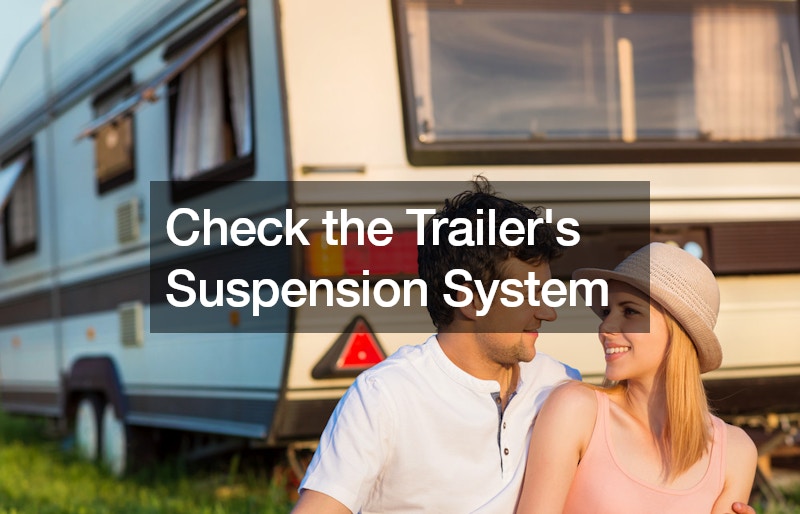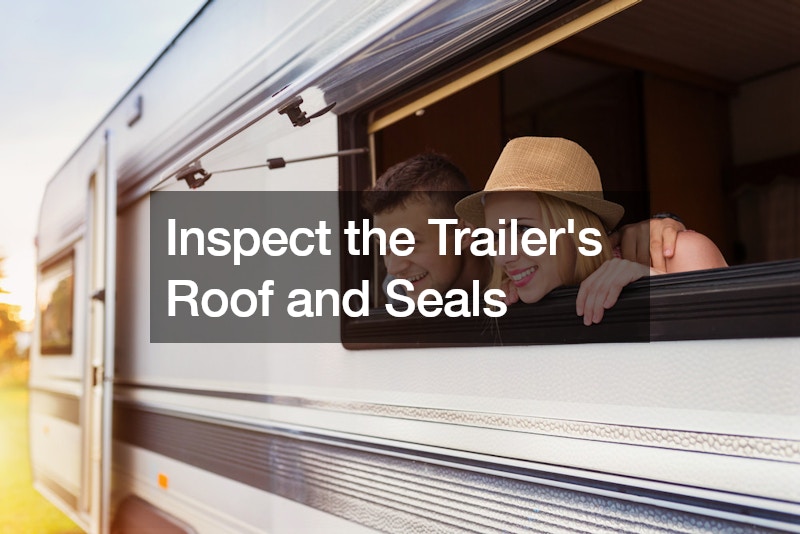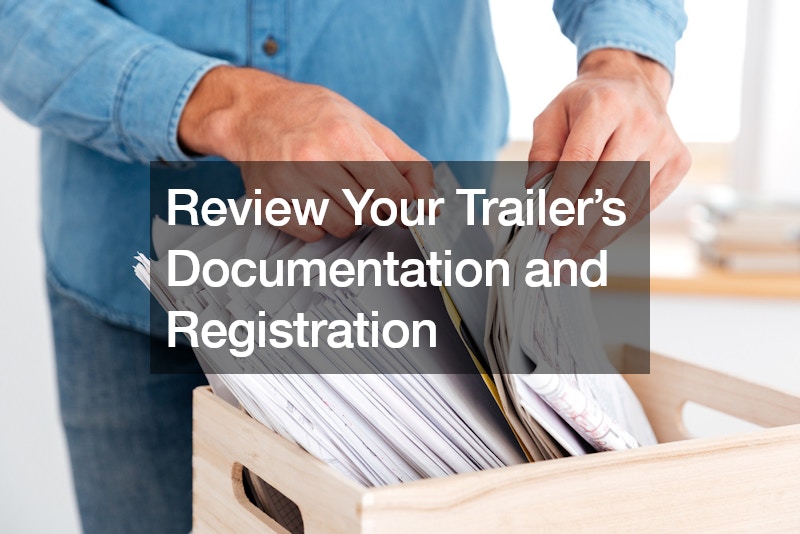Whenever you plan a trip out west, it is an exciting adventure. Whether you’re embarking on a journey to explore national parks or enjoy the vast landscapes, ensuring your trailer is in top condition is crucial for a smooth and safe journey. This article provides a comprehensive guide on vital aspects to check and maintain on your trailer to avoid any potential issues on the road. From inspecting the exterior to verifying the mechanical integrity and documentation, these steps will help you prepare your trailer for your western expedition. Follow these extensive and detailed steps to ensure your trip out west is both enjoyable and trouble-free.
Check the Trailer’s Exterior Condition

Before setting off on your journey, it is essential to thoroughly check the exterior condition of your trailer. Start by examining the outer body for any signs of rust, dents, or damage that could weaken the trailer’s structure. Look for cracks or warping in the trailer’s frame and undercarriage, as these can indicate serious issues. It’s essential to address these problems promptly through reliable automotive repair services to ensure your trailer is roadworthy.
Additionally, inspect the trailer’s paint job and any protective coatings it may have. This will help shield the trailer from the elements, which is particularly important when you plan a trip out west where weather conditions can vary greatly, from intense sun to heavy rain. Make sure all seals around doors and windows are intact to prevent water ingress and subsequent damage to the trailer’s interior.
Lastly, check for any missing or loose exterior hardware, such as screws, bolts, or latches. These small components play a vital role in keeping your trailer secure and well-maintained. Additionally, check out the front of the trailer and ensure it doesn’t need windshield replacement services or windshield repairs. Reinforcing or replacing them will provide peace of mind when you embark on your adventure out west, ensuring that your trailer remains safe and functional throughout your journey.
Inspect the Tires for Wear and Tear
Tires are one of the most critical components of your trailer, and ensuring they’re in good condition is paramount for a safe and smooth trip. Begin by checking the tire treads for any signs of uneven wear, bald spots, or embedded debris. Uneven wear can indicate alignment or suspension issues, so consulting a professional tire service can help you identify and rectify these issues effectively.
Next, examine the sidewalls for cracks, bulges, or other defects that might compromise the tire’s integrity. Cracks or bulges could indicate structural damage that might lead to blowouts or other tire-related problems, especially when you plan a trip out west over long distances and varied terrains. If you find any defects, get them addressed immediately by a tire specialist to avoid potential hazards.
Additionally, ensure that your tires are inflated to the recommended pressure levels. Under-inflated or over-inflated tires can significantly affect your trailer’s handling, stability, and fuel efficiency. Regularly checking your tire pressure and utilizing tire service providers for professional assessments will keep your trailer journey-ready and help you avoid excessive tire wear and fuel inefficiency.
Examine the Trailer’s Brakes and Lights
Safety on the road is paramount, and having a well-functioning braking system is non-negotiable. Start by checking the condition of the brake pads and discs. Worn-out brakes can pose a significant risk, so consult with an automotive repair specialist to replace or service any faulty brake components. Regular brake inspections are crucial for preventing brake failure and ensuring your trailer stops effectively, especially on long trips with varying terrain.
In addition to brakes, the lighting system of your trailer should be thoroughly inspected. Ensure that all lights, including brake lights, turn signals, and tail lights, are operational and clean. Non-functioning lights can lead to accidents and legal issues, making it wise to seek professional assistance if you find any malfunctions. Additionally, inspect the wiring connections for any signs of wear or corrosion, as these can affect light performance.
Properly functioning lights are especially important when you plan a trip out west, where visibility conditions can change rapidly due to factors like weather, time of day, or remote locations. Regular checks and prompt replacements of faulty lights contribute significantly to the safety and legality of your travel, reducing the risk of accidents and keeping you compliant with road safety regulations.
Verify the Trailer’s Hitch and Coupler
The hitch and coupler system is the lifeline that connects your trailer to your towing vehicle, and ensuring their proper condition is crucial for a safe journey. Begin by inspecting the hitch for any signs of rust, cracks, or other wear that could weaken its structure. Look for any bends or deformations that might affect the hitch’s performance. Regular maintenance and replacement through specialized hitch service providers or auto repair shops can help ensure your hitch remains in top condition.
Furthermore, verify that the coupler is secure and free from any defects. A loose or damaged coupler can lead to the trailer detaching from the tow vehicle, posing a severe safety risk. Check the coupler for proper latch engagement and inspect the safety chains for signs of wear or corrosion. Tightly secure and lubricate the coupler to prevent it from seizing up during your journey. Ensure that the safety chains are properly crossed and securely attached for added safety.
Regularly checking and maintaining your hitch and coupler is essential, especially when you plan a trip out west. The long distances and varied terrains require secure connections to guarantee you reach your destination safely. A well-maintained hitch and coupler setup ensures stability on the road, reduces the risk of accidents, and supports a smooth and worry-free travel experience.
Check the Trailer’s Suspension System

A well-maintained suspension system is vital for a smooth and stable ride, particularly over rough terrain. Begin by inspecting the shocks and struts for signs of wear or damage. If you notice any leaks or diminished performance, seek professional trailer repairs to ensure your suspension system is functioning correctly.
Additionally, examine the leaf springs and mounting hardware for any signs of breakage or corrosion. These components are crucial for maintaining the trailer’s load-bearing capacity and stability. Regular checks and prompt replacements will prevent potential mechanical failures on the road.
Maintaining the trailer’s suspension system becomes even more critical when you plan a trip out west. The diverse landscapes and potentially challenging road conditions require a robust suspension system to ensure a safe and comfortable journey.
Inspect the Trailer’s Electrical System
The electrical system is essential for powering various components of your trailer, from lights to onboard appliances. Start by inspecting the wiring for any signs of fraying, corrosion, or loose connections. Look for exposed wires or damaged insulation, and ensure all connectors are secure. Professional wheel repair services and auto electricians can also assist in examining and fixing electrical issues to prevent any malfunctions.
Next, check the condition of the trailer’s battery and ensure it is properly charged. A weak or malfunctioning battery can leave you without essential power, particularly when camping or spending extended periods off-grid. Regular charging and maintenance of the battery will ensure it’s reliable throughout your trip. Consider carrying a spare battery or a jump starter as an added precaution.
Lastly, test all electrical outlets and fixtures within the trailer to confirm they are working correctly. This includes checking the functionality of interior lights, exterior lights, and any appliances you plan to use. Functional electrical systems are vital when you plan a trip out west, providing power for cooking, lighting, and other comfort needs on your journey. A well-maintained electrical system ensures you are prepared for various situations, from remote camping spots to long travel days.
Verify the Condition of the Trailer’s Flooring
The flooring of your trailer experiences significant wear and tear over time. Begin by examining the floor for any soft spots, cracks, or warping that could indicate underlying structural issues. Soft spots can be a sign of water damage or rot, which might compromise the trailer’s safety. Addressing these issues early through professional trailer repairs can prevent further damage and ensure your trailer remains safe for travel.
Additionally, ensure that the floor is clean and free of any debris that might cause abrasions or further wear. Regularly sweep and vacuum the floor to remove grit and particles that can lead to premature damage. Consider using a trailer mat or protective cover to preserve the flooring’s condition during long trips.
If your trailer has wooden floors, apply a protective sealant to guard against moisture, decay, and UV damage. Regularly check for signs of wear on the sealant and reapply it as needed to maintain effectiveness. Properly maintained trailer wheels and flooring are crucial for a safe and comfortable journey. The flooring’s state significantly impacts the overall usability and comfort of your trailer, especially on extended trips out west where rough terrain and varying weather conditions can take a toll.
Inspect the Trailer’s Roof and Seals

The roof of your trailer plays a crucial role in protecting the interior from the elements. Start by inspecting the roof for any signs of leaks, cracks, or damage. Addressing these issues promptly, possibly through recommendations from your insurance company, can prevent water ingress and potential structural damage.
Next, check all seals around the edges of the roof and any rooftop fixtures, such as vents or air conditioning units. Deteriorated or missing seals can lead to leaks and water damage, especially in regions with unpredictable weather. Regularly replacing worn-out seals is essential.
Maintaining the roof and seals is particularly vital when you plan a trip out west, where environmental conditions can be harsh and varied. Keeping the roof well-maintained ensures the interior remains dry and protected, enhancing the comfort of your journey.
Test the Trailer’s Loading and Unloading Mechanisms
Efficient loading and unloading mechanisms are essential for the practicality of using your trailer. Start by testing all doors, ramps, and loading bays to ensure they open and close smoothly. Check for any signs of misalignment, squeaking, or sticking parts, which could indicate the need for repairs or maintenance.
Any resistance or difficulty in operation might suggest the need for professional trailer repairs or servicing to maintain optimal functionality. For instance, a misaligned ramp might require adjustments, and a squeaky door might need lubrication or part replacement.
Additionally, inspect the latches and locks on these mechanisms for any signs of wear or malfunction. Secure latches and locks are crucial for keeping the contents of your trailer safe during transit. Regular maintenance and lubrication can extend their longevity and reliability, which is essential for the extended travel of a trip out west.
Lastly, practice loading and unloading your trailer with the actual equipment or cargo you plan to take on your journey. This practice ensures that the mechanisms work efficiently under real conditions and that you can handle the loading process smoothly. Ensuring your loading and unloading systems are fully operational will facilitate a smoother and more efficient journey, reducing stress and delays during your trip.
Review Your Trailer’s Documentation and Registration

Having all the necessary documentation and registration papers for your trailer is crucial for compliance with legal requirements. Start by verifying that your trailer’s registration is up to date and that you have all related documents on hand. This can help avoid potential fines or legal issues during your trip.
Additionally, review your trailer’s insurance policy to ensure it provides adequate coverage for your journey. Consulting with your auto insurance provider can give you peace of mind by confirming that your policy covers all aspects of your trip, especially when you plan a trip out west.
Lastly, keep a copy of your trailer’s maintenance records and any repair history. These documents can be crucial in case of needing an automobile accident lawyer, having a mechanical issue, providing a detailed record for auto insurance claims, or assistance from an insurance company. Being thoroughly prepared with the right documentation ensures a worry-free travel experience.
Ensuring that your trailer is in optimal condition is key to a successful and enjoyable trip out west. From examining the exterior and tires to verifying the electrical system and reviewing documentation, each step is vital for preparing your trailer for the journey. Regular maintenance and prompt repairs not only enhance safety but also prolong the life of your trailer. By following these comprehensive guidelines, you can be confident that your trailer is ready to tackle the adventures and landscapes of the western frontier. Properly preparing your trailer before you plan a trip out west will allow you to focus on enjoying the journey, knowing that all critical components are in top condition.

